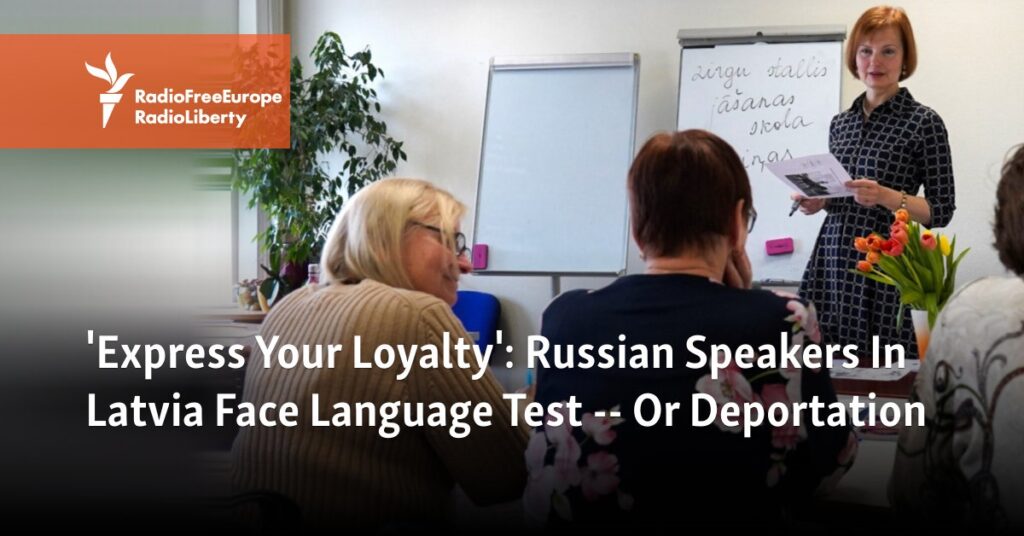Men dressed in military uniforms gather at the Victory Monument as members of the Russian minority mark the end of World War II and commemorate the Soviet victory over Nazi Germany in Riga on May 9, 2017.
But while the Kremlin has sought to portray Russian-speaking minorities in neighboring countries as oppressed by the majorities, many Russian speakers in Latvia have distanced themselves from the Kremlin’s aggression.
Latvia’s Harmony party, which represents Russian speakers, was once widely seen as pro-Russian and had ties with the ruling United Russia party in Moscow. But the party has condemned Russia’s invasion of Ukraine, and one of its members of parliament, Boris Cilevics, told the BBC: “[Modern Russia] is absolutely analogous of the policy of Nazi Germany — the only chance for normalization is a military defeat for Russia.”
According to the PMLP, more than 85 percent of those Russians who fell under the new law have already completed all the necessary documents and have either already passed the exam or are learning Latvian and have received a temporary residence permit (valid until the exam is passed).
But Russian state media and propaganda has run with the topic of deporting those who failed the exam and claim discrimination against all Russian speakers. For more than a year, Russian media have repeated stories of Latvia “forcibly deporting Russian-speaking pensioners.”
The Latvian government emphasizes that there is no discrimination against Russian speakers in the country: Latvia imposes exactly the same language requirements on all foreigners who want to obtain a residence permit. And those who fail the exam from other countries are also expelled.
“In Latvia, many emigration orders are issued every year. There is a general procedure. I think that here, too, we should not expect any special treatment. At the moment, it is clear that some people have already left earlier, without reacting or contacting the Office of Citizenship and Migration Affairs,” Latvian Prime Minister Evika Silina said. “But Russian propaganda always chooses how to twist Latvian news in its own way.”
The changes to the migration law in Latvia affected approximately 25,000 people. Public debate within the country led to the Latvian parliament amending the law in September 2023: the language requirements remained, but people were given more time to learn the language and pass the exam. This applies to residents of the country who received Russian citizenship after May 2003, who have already tried to pass the test but failed the exam, or who did not attend the exam for valid reasons.
“Amendments to the immigration law are needed,” Latvian journalist Inga Springe told Current Time in September 2023. “I am sure that this law needs to include an age limit of up to 65 years.
“Mostly these are older people with health problems and lower mental abilities,” Springe added. “We ourselves, as a state, have choked on this piece and don’t know what to do. Now we have 10,000 people who did not sign up for this exam at all. Many people need to retake it. And if now their residence permit expires, it is clear that no one will deport them. It is impossible to expel so many people from the country.”
A class-action lawsuit was also filed against the language requirements in Latvia’s Constitutional Court, but it upheld the language requirements for Russian citizens as legal.
“Citizenship is a serious concept. It shows the choice a person has made regarding which state he or she expresses loyalty and solidarity to,” Aldis Laviņs, the head of the Constitutional Court, said. “This particular case is related to former Latvian citizens and noncitizens who have decided that they want to link their loyalty to the Russian Federation. We must understand that in the current geopolitical situation, when the Russian Federation has unleashed a war in Ukraine and is taking unfriendly actions toward Latvia, by introducing such a requirement, the state is providing a mechanism to ensure that Russian citizens permanently residing here do not pose a threat to Latvian society.”
Meanwhile, Russian regional authorities have declared their readiness to accept Russian speakers deported from Latvia. The governor of Pskov, Mikhail Vedernikov, has already promised that the region will provide any deportees with all the necessary assistance: “The temporary accommodation center is practically ready.”
Source link : http://www.bing.com/news/apiclick.aspx?ref=FexRss&aid=&tid=66f34eb2ee7d4bdb98fddc14027db6a7&url=https%3A%2F%2Fwww.rferl.org%2Fa%2Frussia-latvia-residents-deportation%2F33116047.html&c=14015471592381897284&mkt=de-de
Author :
Publish date : 2024-09-15 22:04:00
Copyright for syndicated content belongs to the linked Source.
